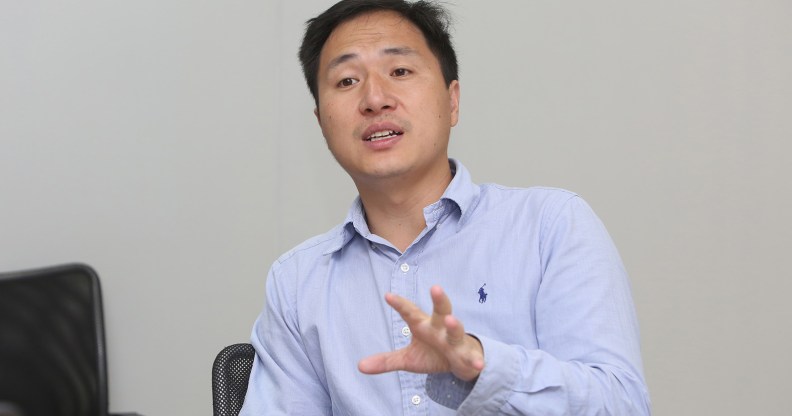Scientist who edited babies’ genes to make them ‘HIV immune’ jailed for three years

He Jiankui has been jailed for three years. (Getty)
He Jiankui, the Chinese scientist who claimed to have created the first ever gene-edited babies, has been jailed for three years.
Jiankui sparked a global backlash in November 2018 when he announced the birth of twin girls whose genes had been edited in an attempt to make them immune to HIV.
A year on, he has been found guilty of “illegally carrying out the human embryo gene-editing intended for reproduction,” according to the state news agency Xinhua.
He was sentenced to three years in prison and fined three million yuan (£330,000).
Two of Jiankui’s fellow researchers were also handed jail terms and fines. Zhang Renli was sentenced to two years and fined one million yuan, with colleague Qin Jinzhou handed a suspended 18-month sentence and a 500,000 yuan fine.
The court in Shenzhen said that all three men “did not have the proper certification to practise medicine” and had knowingly violated Chinese medical regulations.”
They were accused of “seeking fame and wealth” through their actions, with the court adding: “They’ve crossed the bottom line of ethics in scientific research and medical ethics.”
Scientists’ attempt to immunise babies from HIV may have failed.
Jiankui, who worked at the Southern University of Science and Technology in Shenzhen, altered embryos in an attempt to disable the CCR5 gene which allows HIV to enter a cell.
People who have a naturally defective CCR5 gene are effectively unable to acquire HIV, but are more susceptible to other viruses, according to Dr Kiran Musunuru, a University of Pennsylvania gene-editing expert.
Musunuru told The Guardian in 2018 that the experiment was “unconscionable” and “not morally or ethically defensible.”
In December 2019, weeks before Jiankui’s sentence was announced, it was revealed that his attempts to immunise the children from HIV may have failed and created unintended mutations.
Leaked excerpts from the original research were published for the first time by MIT Technology Review, complete with Jiankui’s claim of a mediucal breakthrough that could “control the HIV epidemic.”
However Fyodor Urnov, a genome-editing scientist at the University of California, Berkeley, told the publication: “The claim they have reproduced the prevalent CCR5 variant is a blatant misrepresentation of the actual data and can only be described by one term: a deliberate falsehood.”
Urnov added that the research team failed to produce the CCR5 gene variant, and called the claim that gene editing could help end HIV transmissions “equal parts delusional and outrageous.”

